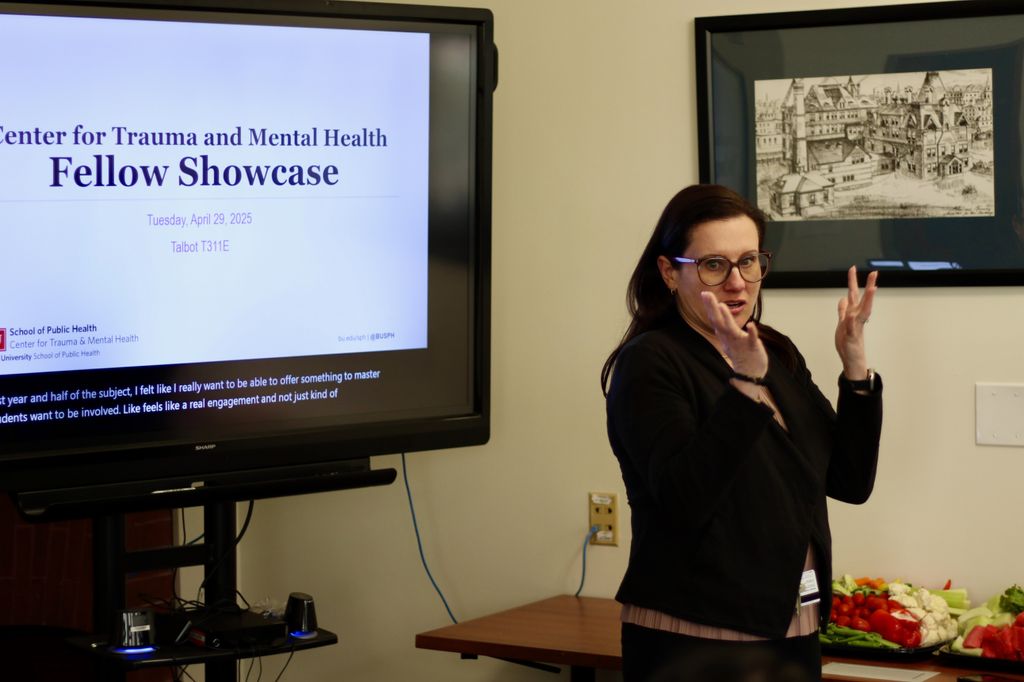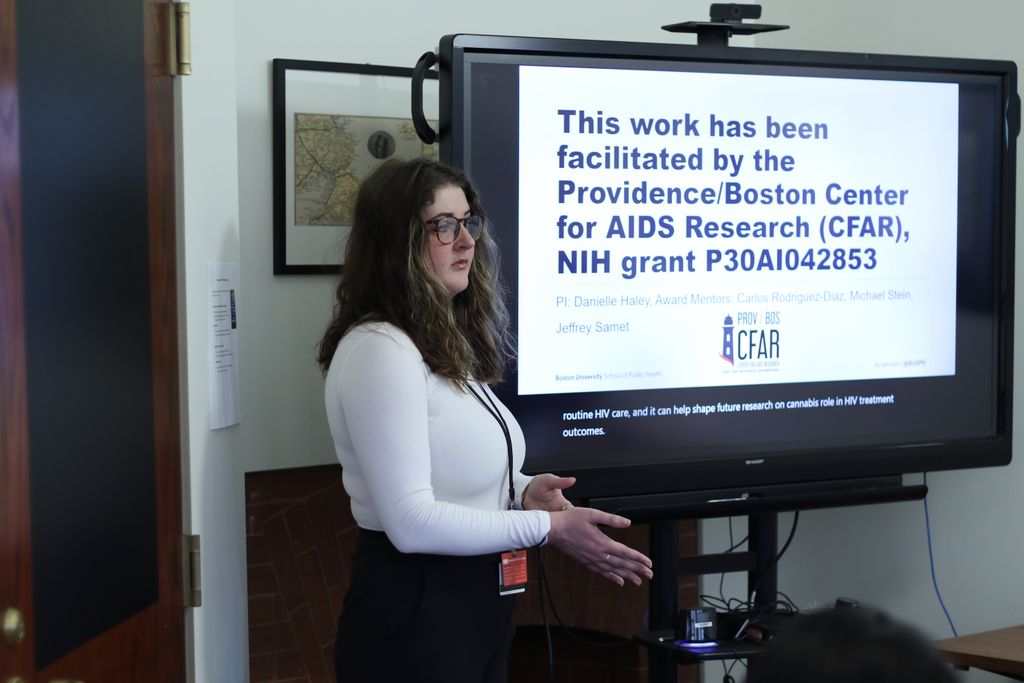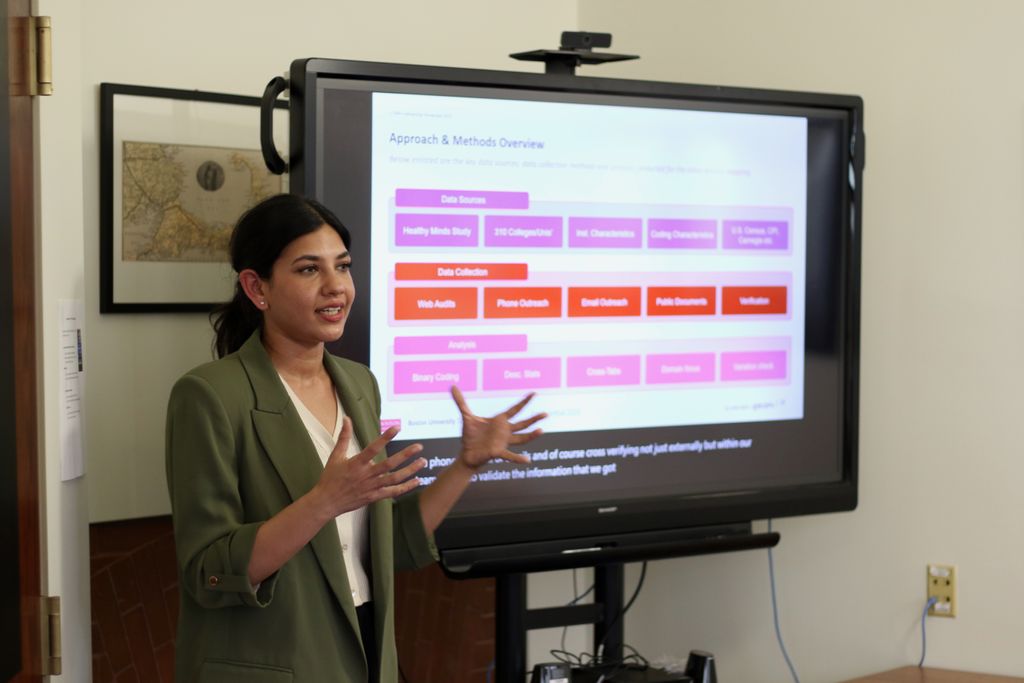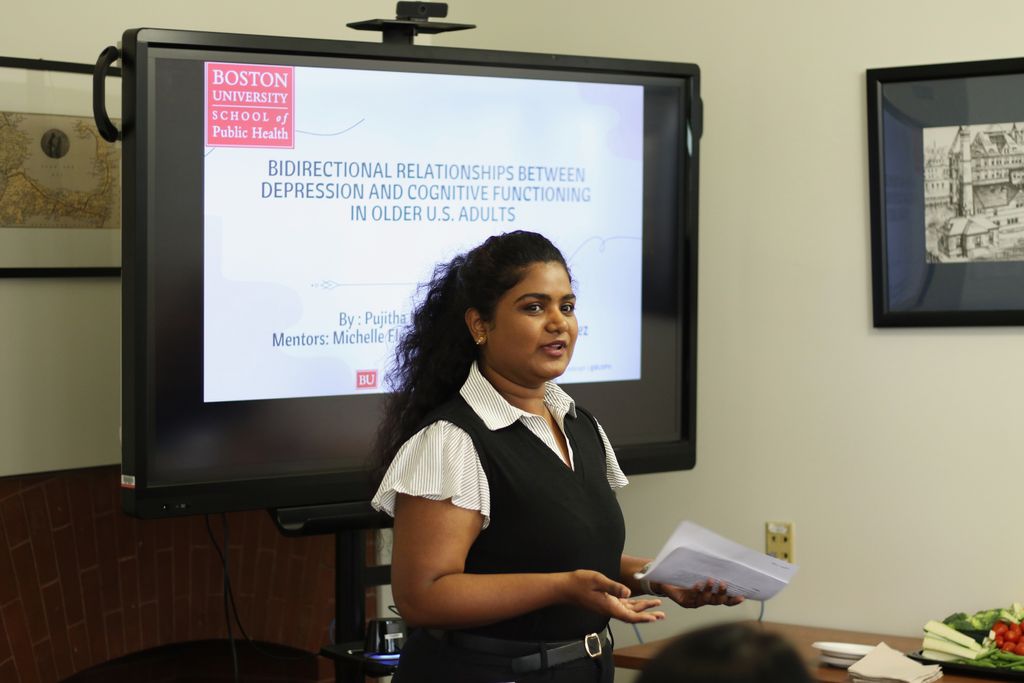Student Fellows Showcase Research on Mental Health and Trauma.
Six MPH students participated in the program, which paired students with CTMH faculty and staff to support independent research projects

Student Fellows Showcase Research on Mental Health and Trauma
The Center for Trauma and Mental Health launched its first graduate student fellowship this semester. Six MPH students participated in the program, which paired students with CTMH faculty and staff to support independent research projects.
The Center for Trauma and Mental Health (CTMH) at the School of Public Health debuted its first cohort of graduate student fellows this semester. Six MPH students were matched with faculty and staff affiliated with the Center to collaborate on original research projects. Center funding ensured that fellows were compensated for the 50 hours they each dedicated to the work.

Established in 2023 under the leadership of Jaimie Gradus, professor of epidemiology, the CTMH is a cross-disciplinary hub for scholarship aimed at furthering understanding of stressful and traumatic events and their consequences. The Center brings together seasoned and budding researchers under the common goal of identifying vulnerable populations and studying interventions to prevent adverse health outcomes.
Gradus says that since the Center launched, she has been awed by the amount of interest from both current and incoming master’s students. “It is fundamental to the mission of CTMH to raise awareness of trauma and mental health as public health issues,” she says. “And I hope that offering an opportunity like this to groups of students, who are just beginning their careers in public health and will take what they learned from this experience out into the world, is one way we might do that.”
The fellows presented their findings and took questions on their research from an audience of their mentors, peers, and other members of the SPH community at a showcase event on Tuesday, April 29.

Back row from left: Kinkini Bhaduri, Chigozi Okuagu, Haider Rauf, Patrece Joseph, Martine Geary-Souza, Danielle Haley, Lauren Goodall
Front row from left: Michelle Flesaker, Pujitha Kondru, Jeanine Nasser, Jaimie Gradus, and Casey DeMarsico
Lauren Goodall, who studies epidemiology and biostatistics, was one of two fellows to collaborate with Danielle Haley, assistant professor of community health sciences, on a research project into provider interactions with HIV patients around cannabis use. Goodall developed a passion for mental health after a series of deeply personal experiences, including losing a best friend to suicide and another to opioid overdose.

“I have a deep desire to create a safer, more mental health-friendly world,” says Goodall. “And [I] believe that in pursuing my MPH, I will be able to create a career in psychiatric epidemiology doing meaningful research on topics such as suicide, suicide loss, trauma, PTSD [post-traumatic stress disorder], and SUDs [substance use disorders] that I believe to be important to global public health […] so when this fellowship was presented, I jumped at the opportunity to get involved and to gain meaningful research experience in a field that I care deeply about.”

Martine Geary-Souza, the second fellow under Haley’s mentorship, studies community assessment, program design, implementation, and evaluation and like Goodall, intends to pursue a career in psychiatric epidemiology. Geary-Souza led qualitative analysis of interviews conducted with HIV care providers for the project. During her presentation, she discussed some of the preliminary themes she has identified using the qualitative data analysis tool NVivo. Although she graduates this semester, she intends to remain involved in the project and author a paper covering the team’s results. She also plans to apply what she has learned as she seeks to establish her own healthcare consulting and advocacy organization aimed at implementing trauma-informed care practice into the healthcare system through updates to the graduate medical education curriculum and accreditation standards.

Haider Rauf, who trained as a dentist in Pakistan before coming to the U.S. to pursue his MPH in epi/bio at SPH, shared the results of a literature review he conducted on the relationship between exposure to racial discrimination and Southwest Asian and North African (SWANA) mental health. He completed the review under the mentorship of AJ Rosellini, associate professor of epidemiology, and Jeanine Nasser, research fellow in the Department of Epidemiology. Rauf, like Geary-Souza, plans to apply what he learned during the fellowship to his personal pursuits post-graduation. While he hopes to gain admission into a U.S. dental program for international dentists so he can one day treat patients in the U.S., he also hopes to conduct his own clinical research. For his first project, he is studying the effects of psychotropic medications on pediatric oral health. His sample population comprises of children from the U.S., but he anticipates that the findings may also be applicable in Pakistan, where funding a similar study would likely prove difficult, he says, but similar concerns exist about the side effects of increased pediatric psychotropics prescriptions.

Kinkini Bhaduri, who came to SPH from India where she studied pharmacy, applied to the CTMH fellowship alongside Rauf after meeting him through the epi/bio certificate. In her presentation, Bhaduri discussed variations in campus policy environments affecting transgender and nonbinary college students. She collaborated with Sarah Lipson, associate professor of health law, policy and management, and several SPH peers on an initiative to catalogue the policies last summer. Chigozie Okuagu, another epi/bio student and CTMH fellow, presented on the research she conducted into structural violence and adolescent mental health under the mentorship of Patrece Joseph, assistant professor of community health sciences. Both Bharduri and Okuagu are also graduating this spring.

Pujitha Kondru earned a Doctor of Pharmacy degree in India prior to pursuing an MPH in epi/bio at SPH. While she was trained to focus on individual patient care, she says she always wondered whether she might have a broader impact on her community through clinical research. While earning her MPH, Kondru works part-time as an administrative assistant at the Albert & Jessie Danielsen Institute at BU, where she has gained exposure to mental health services and trauma-informed care. The experience motivated her to apply for the CTMH fellowship so she could contribute to research to support healing. Under the mentorship of Marcia Pescador Jimenez, assistant professor of epidemiology, and Michelle Flesaker, a research fellow in the Department of Epidemiology, Kondru looked at the bidirectional relationships between depression and cognitive functioning in older U.S. adults.
From the beginning, her mentors encouraged her to share her ideas, Kondru says. “Their feedback consistently pushed me to think more critically and clearly. They not only guided my project but also encouraged me to grow on a personal and professional level. I truly appreciated how present and engaged they were, and I feel lucky to have had the opportunity to learn from both.”
Gradus says she felt immense pride during the showcase, “both because we have finally set up something that I believe is maximally responsive to student interest and because the presentations from the first cohort of fellows were so stellar! I really could not have been more impressed.”
